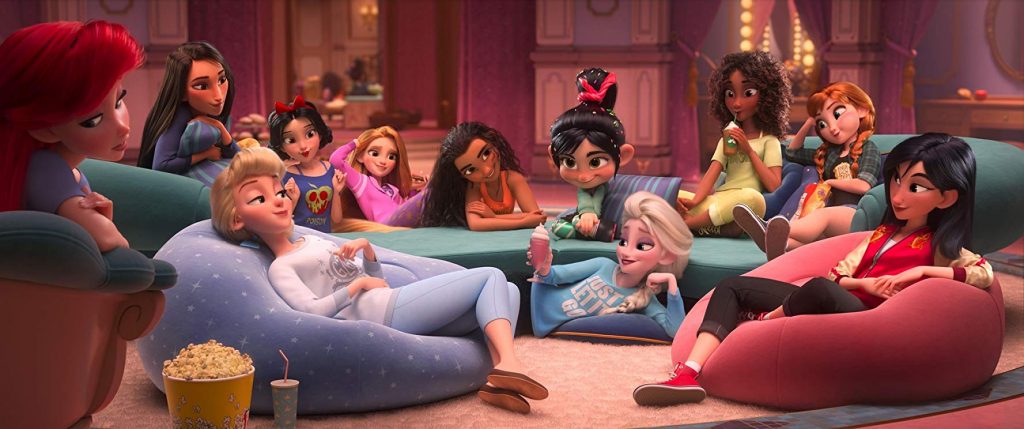I recently went to see the sequel to Wreck it Ralph, “Ralph Breaks the Internet”. Not a bad film but not a particularly good one either, with a generally mediocre feel across the board. However, this particular film left me feeling slightly strange, as if it had thrown in a scene of extreme violence for a few seconds before continuing as if nothing had happened. I then realised that this was the same feeling I experienced after watching 2018 Rom-com “Crazy Rich Asians”. And with that thought the uneasy feeling finally made sense to me.
Extremely unsurprisingly, the bulk of “Ralph Breaks the Internet” takes place online, in an imagining of the internet as a physical world similar to the video games of the first “Wreck it Ralph”, with sites like Instagram and eBay being represented as an art gallery and an auction house, for example. Indeed, the world is entertaining to see and clearly a lot of thought has gone into representing the little nuances of the internet as real-world things, like pop-up ads as people on the street trying to sell you things.

Scene from ‘Ralph Breaks the Internet’ (source: https://www.imdb.com/title/tt5848272/mediaviewer/rm877949184)
This is where the problems begin for me. I found the same strange feeling watching this as I do when it’s clear that the film seems to be pushing a character as good when actually they are not very pleasant; a disconnect between the filmmaker and the audience. This is the case with Ralph Breaks the Internet. The film routinely presents fairly sinister and dangerous parts of the internet as fun and friendly, without any mention of the darker side. I’m not talking about the “DarkWeb”, but rather the more obvious and malicious entities online that we come into contact with every day. Giant mega corporations like Google and Disney that control vast media empires are depicted as lovable and fun (though this is expected, it is a Disney film after all); dangerous pop-up ads that are more than likely scams are shown to be just down-on-their luck average Joes that “just need those clicks, man”; and most insidiously, the worrying nonchalance that the film shows us how much the various algorithms within social media control exactly what kind of media we see and consume.
One of the central characters in this film (minor spoilers, but do you really care that much?) is Yesss, the “head algorithm” for Buztube, a popular video sharing site. Throughout the film, she directly manipulates the many users (ironically depicted as little more than mindless drones who will do whatever they’re told) to watch Ralph’s videos, artificially inflating his popularity and influence. It doesn’t take a great leap to imagine that this power could easily be (and indeed, is) used to great extent and effect in real life as an extremely powerful and immoral propaganda tool.
Now on to Crazy Rich Asians. This is a classic, semi-original “meet the parents” plot where a young Chinese-American woman visits Singapore to meet her boyfriend’s family, unaware that they are the richest and most influential family in the country. While entertaining at times, it would have been largely unmemorable were it not for the more or less entirely Asian cast and impressive displays of wealth, which neatly brings me onto the main issue of the film.

Scene from ‘Crazy Rich Asians’ (source: https://www.imdb.com/title/tt3104988/mediaviewer/rm244728320)
Most of the cast in “Asians” is obscenely wealthy. Not just rich but rather people with so much dough that denominations as little as £50 don’t even really register to them as actual amounts of money. And they’re not afraid to spend it either, with lavish parties held for any and all occasions.
When discussing the upcoming wedding, for example, a few of the characters gossiping claim that the wedding cost around $40 million, an absolutely obscene amount of cash and more that most people will make in their entire lives. Obviously this is a special event, but not once do any of the characters seem to think that the money could’ve been spent better elsewhere.
This really put me at a disconnect from the cast. Whenever they had issues, they always seemed rather trivial due to the fact that they’d never had to worry about money or any issues arising from that in their whole lives, such as getting an education, job or house.
“Oh but you’re missing the point!” you cry out in anguish. “The point is that even though they’re rich, they are still people with thoughts and feelings!” This is true; the characters are mostly pleasant people and admittedly don’t commit morally disgusting actions like most of the real worlds super-rich. But for all the effort the film makes in striving to be “woke”, it seems to sidestep the arguably large, glaring issue of obscene wealth and wealth inequality that pervades the entire film then seeks to distract you with pretty colours and precious metals. In an age where the wealthiest billionaires on the planet own as much money as half of the rest of the world, the film felt at a disconnect when the characters essentially threw away large (by our standards) amounts of money.
At a time where wealth inequality and corporate control of the media and internet are key and pressing concerns, these films felt very off by failing to address such issues at all.
